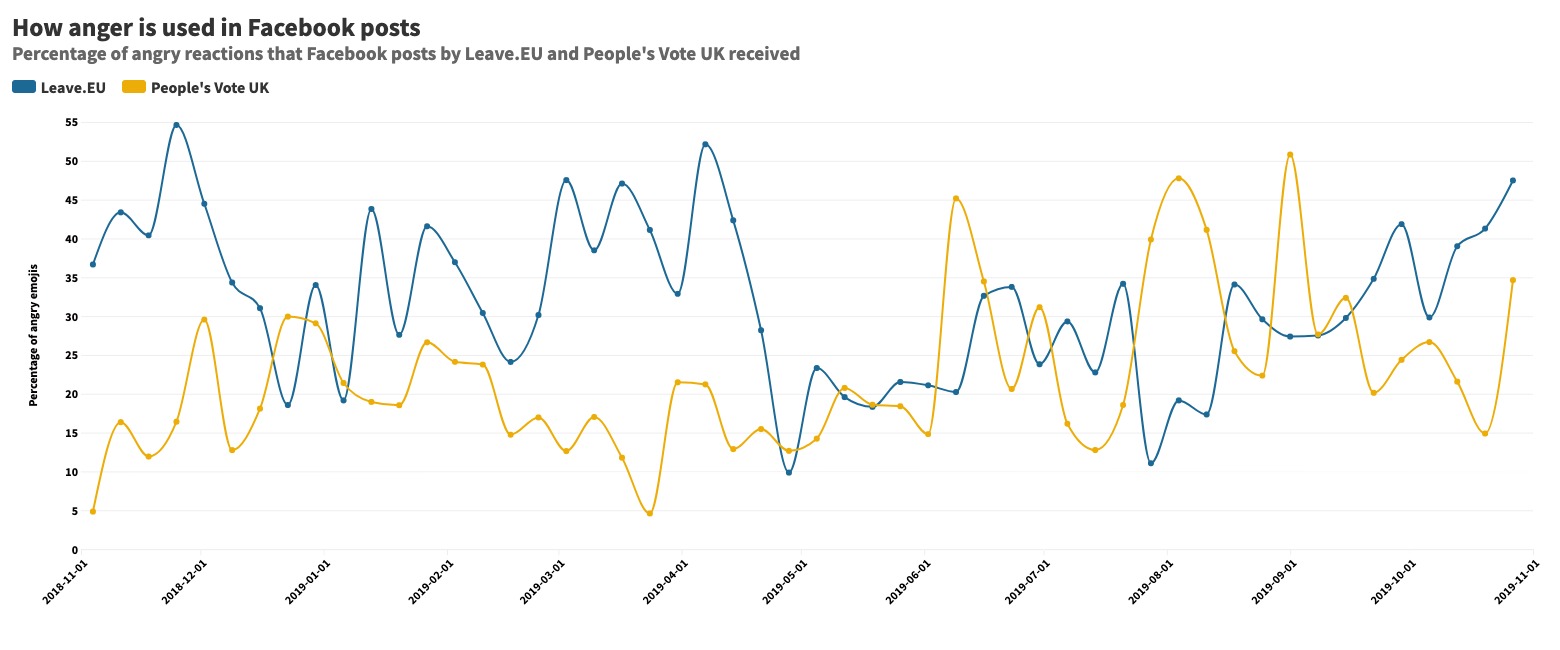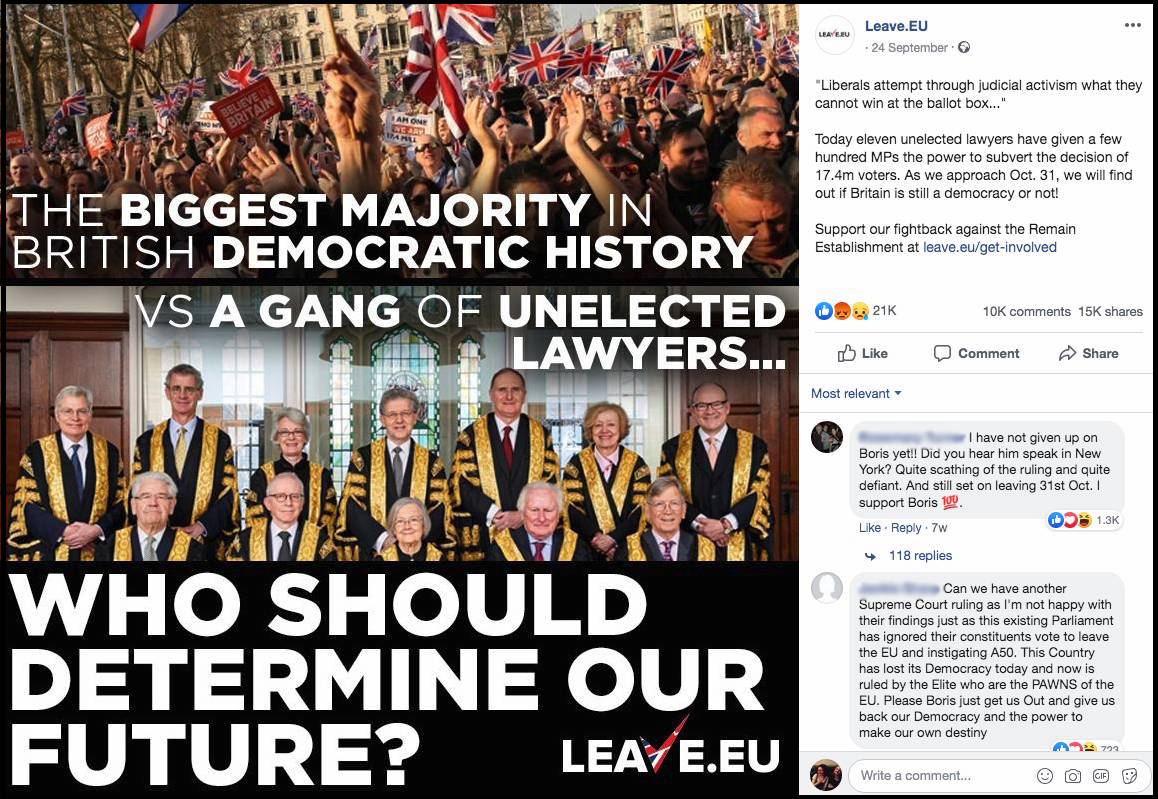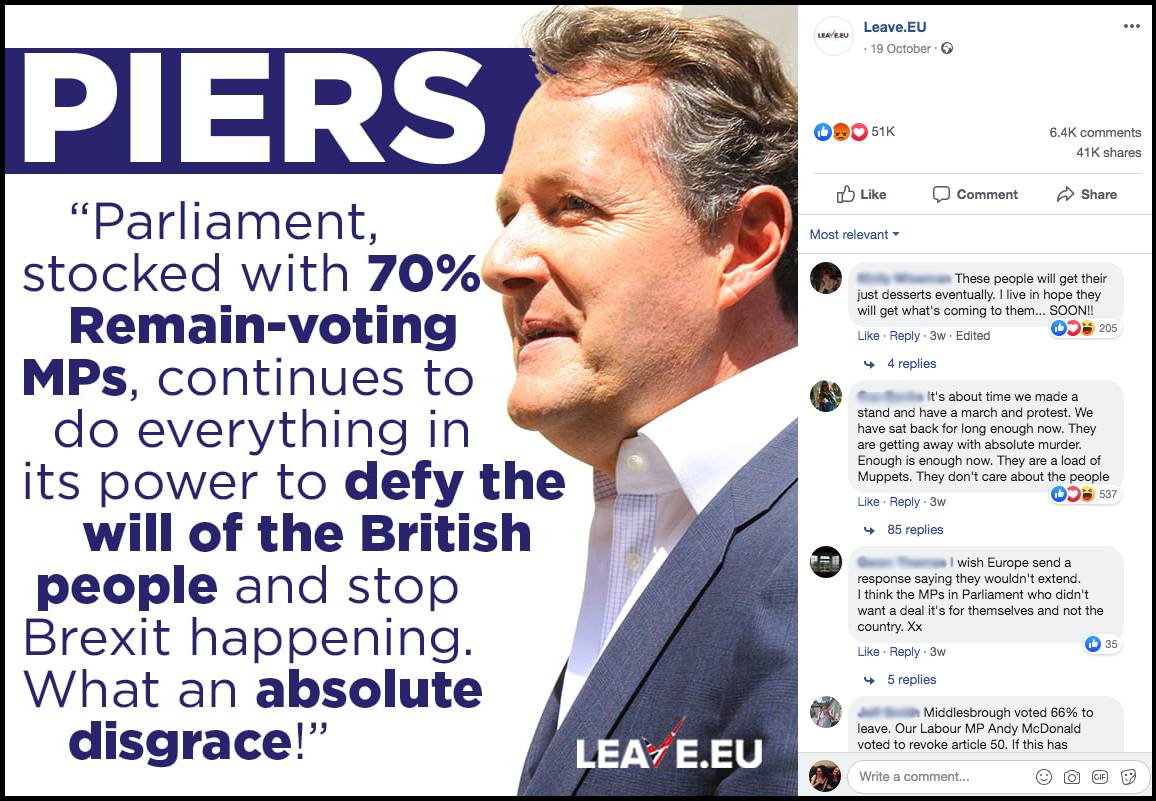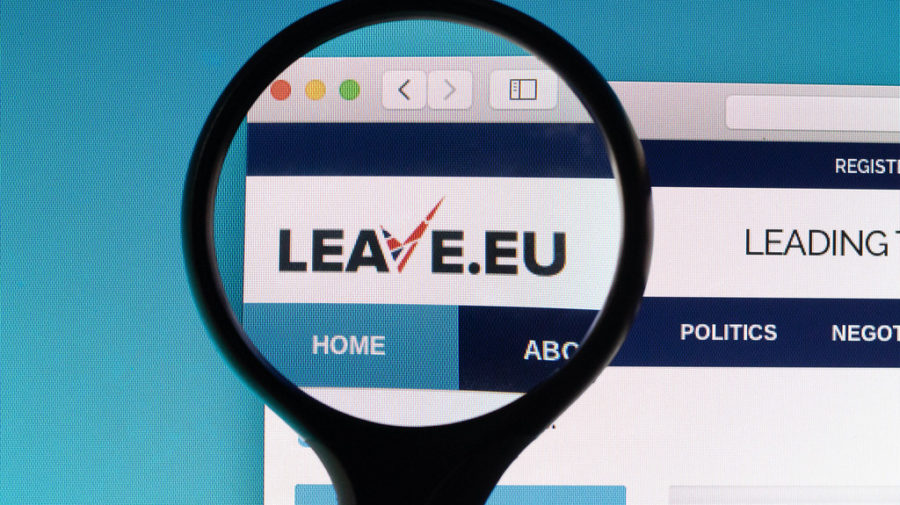Brexit continues to exert an overbearing influence on British politics some three-and-a-half years on from the EU referendum. As the country approaches its second general election since the 2016 vote, the topic remains fraught with disinformation and discord.
Research conducted by First Draft has found that the Facebook Page for Leave.EU, one of the key campaigning groups that supported the UK’s withdrawal from the bloc, dominates the Brexit discussion on the social media platform.
With over two billion people on the site, including 40 to 50 million monthly UK users, Facebook is the world’s largest social network, meaning the impact of the political campaign group’s digital presence is highly significant. With Brexit polling as voters’ primary concern in the upcoming general election, many will be casting their ballot in accordance with their preferred outcome for Britain’s future relationship with the EU.
First Draft investigated the page’s reach after it consistently topped engagement charts with far more interactions than any other Facebook Page sharing content about Brexit.
Using social monitoring service CrowdTangle to track a series of Brexit keywords, First Draft found Leave.EU’s posts received far higher total levels of interaction than any other pages posting about the subject. This includes other Brexit-related campaign pages, like Best for Britain and People’s Vote UK, but also official pages for political parties, their leaders and international media organisations — including Prime Minister Boris Johnson and BBC News.
“We are hardwired to pay attention to controversial, divisive or shocking content — it’s part of our evolutionary response, a key part of our human attention logic.” – Lisa-Marie Neudert, Oxford Internet Institute
It also regularly topped CrowdTangle’s “share of voice” metric, which showed the page consistently receiving 10-15% of all interactions on Facebook on posts about Brexit.
CrowdTangle caveats the data it provides, explaining “measuring total interactions or views on social media is an imperfect way to gauge an account’s influence, in part because it does not distinguish between types of engagement”. CrowdTangle also does not track Facebook posts only made visible to specific groups of followers.
Leave.EU, whose leadership has become controversial for their links to Cambridge Analytica and fines for breaking electoral spending laws, employs a combination of tactics to promote its narratives on Facebook, which include attacking the ‘remainer elite’ and advocating for a no-deal Brexit.
The high volume of interactions with each post, a relatively high number of posts per day, and narrative themes which experts referred to as containing “a more direct emotional resonance” than other sources all contribute to Leave.EU’s dominance of the Brexit conversation on Facebook.
Populist narratives, anger and disinformation
The populist narrative of the ‘remainer elite’ thwarting the leave-voting people’s democratic mandate is central to Leave.EU’s messaging and is at times underlined by misleading information.
First Draft’s analysis focused on the months of September and October, examining the page’s 100 most shared posts over the period for signs of information disorder. We found examples of mis- or disinformation including conspiracy theories about Jo Swinson; a photoshopped image of a woman making an offensive gesture at Labour leader Jeremy Corbyn; multiple untrue claims that Labour planned to “abandon immigration controls altogether”.
The page was also central in distributing claims about the British Supreme Court judges who ruled against the government in September, implying their decision was motivated by links to Europe rather than the law.
Leave.EU declined to comment.
Disinformation is often designed to provoke a powerful emotional response, and research has found that the feeling most likely to push people to share a post is anger. As well as the traditional ‘like’ interactions on Facebook, the platform now lets users react in different ways: with ‘love’, ‘haha’, ‘wow’, ‘sad’ and ‘angry’ emoticons.
Almost a third (31.6%) of the emotion-based reactions to Leave.EU’s posts over the last year were angry reactions, compared to just over a fifth (21.8%) on posts from People’s Vote UK, the most followed pro-Remain Page on Facebook. In the two months leading up to the intended date of Brexit — October 31 — this rose to 35% for Leave.EU and 22% for the People’s Vote UK page.
This is an indication of the type of emotional reaction generated by the content they are sharing, and may point to why Leave.EU exerts so much influence over the political conversation on Facebook.

Over the course of a year, Leave.EU’s posts received 10% more angry reactions than People’s Vote UK’s. Data visualisation by Rory Smith.
Combining highly emotional language, arresting visuals and polarising narratives, Leave.EU’s messages often reach further than its competitors.
Lisa-Maria Neudert, a researcher at the Oxford Internet Institute, explained: “Those putting out disinformation are often highly digitally literate — they know what will get a viral reaction, both in terms of content and form. We see [these pages] sharing memes, images — generally concise content loaded with controversy.”
Neudert underlined how dissent over controversial topics can drive online engagement. She explained how in addition to fans reacting to Leave.EU’s messaging in irritated agreement, a proportion of the angry reactions were likely to be from users who disagree with Leave.EU’s messaging and are engaging to express disagreement.
“Similarly, you often see people in the comments arguing against pro-Brexit posts, and in that way driving engagement to the page. Of course, this happens on both sides of the political divide,” she stressed.
Leave.EU underlines its divisive and provocative narratives with charged language.
For example, one post describes the Supreme Court judges who ruled Boris Johnson’s parliamentary prorogation unlawful as a “gang of unelected lawyers” opposing the “biggest democratic majority in British history”. Another describes EU chief negotiator Michel Barnier as a “creep” and the Withdrawal Agreement as a “rotten treaty”.

The Supreme Court judges became a target of Leave.EU’s posts after they ruled Boris Johnson’s prorogation of parliament unlawful. Screenshot by author.
Considering why polarising content performs so well online, Neudert added: “We are hardwired to pay attention to controversial, divisive or shocking content — it’s part of our evolutionary response, a key part of our human attention logic.”
The size of the different pages is also important. There is a significant gap between Leave.EU, which boasts 993,800 likes, and big pro-Remain pages like People’s Vote UK, which lags behind at 607,800.
However, the difference in the number of interactions — how often each page’s posts are shared, commented on or reacted to — is sizeable even when bearing in mind the difference in the number of people who like the page.
Leave.EU has over 50% more Facebook likes than People’s Vote UK. However, according to Analytics, a tool from social media monitoring firm NewsWhip, the average post by Leave.EU during the period examined received ten times (1000%) the interactions that People’s Vote UK gained.
Image-text memes
Analytics also showed that Leave.EU used images more regularly than other Brexit-related campaign pages over the period, and more than other types of post.
Many of the posts are essentially memes: images, often in striking colours, with text written over them. Leave.EU’s preference for photos also enables the page to fire out several original posts each day; posting an average of 7.4 times a day compared to People’s Vote UK’s 3.6. This allows Leave.EU to flood users with a steady stream of cheap, shareable, hyperpartisan, and attention-grabbing information.
One of Leave.EU best-performing posts include an image-text meme of the Supreme Court judges as “enemies of the people”. It was shared more than 15,000 times and received more than 46,000 interactions.
Without full disclosure of Facebook’s algorithmic biases it is difficult to be sure which type of media performs best across an aggregate of pages. It is important to remember that Facebook’s ‘pivot to video’ — where video content was pushed above all other types of posts — was based on metrics that overestimated video’s engagement rate.

Emotive language and image-text memes are effective ways of pushing followers to share content. Screenshot by author.
Considering the type of political posts that perform well on social media, Dr. Andrew Chadwick, Professor of Political Communication at Loughborough University, said: “Researchers are starting to learn more about what seems to cut through online: simpler, emotional, narrative-driven messages reinforced by visuals and image-text memes.”
The gulf between Leave.EU and the People’s Vote UK’s online presence is apparent in the pages’ most shared posts over the period, both of which make reference to the ‘will of the people’.
Tellingly, while Leave.EU uses a text-based image to underline how ‘remainer MPs’ have defied it, the People’s Vote UK turns the phrase on its head in a slightly tongue-in-cheek video, exclaiming: “I am Will. You are Will. We are all the ‘will of the people’”.
At the time of writing Leave.EU’s photo is on 41,000 shares. The People’s Vote UK video hasn’t hit 5,000.
Direct messaging
This reflects how Leave.EU’s Facebook output — simple, easy to both digest and to disseminate — effectively showcases the Leave campaign’s direct messaging. Dr. Chadwick suggested this messaging may also be behind the page’s online success.
“We saw the first signs of this during the 2016 referendum campaign, when it became clear that Leave had a clearer, more emotionally direct message about the benefits of Brexit, when compared with the Remain side. While I am in no way arguing that the benefits of Brexit are simple and clear, there is a more direct emotional resonance to slogans such as ‘take back control’.”
Acknowledging the caveat that proportions of voice share may be different on other social platforms, Dr Chadwick said: “Facebook is still by far the largest social media platform in the UK, so if we assume that this engagement gap is based on authentic behaviour by Leave supporters — and authenticity is something that we should always consider — what this demonstrates is how significant social media messaging has become for the pro-Brexit side of the argument.”
‘Disinformation from official sources’
With its effective strategy of producing an onslaught of provocative and digestible memes, Leave.EU looks likely to continue to have one of the loudest voices in Facebook’s political sphere.
But considering how social media impacts political debate, Neudert is particularly concerned about disinformation coming from official origins as the UK prepares to head to the polls on December 12.
“One of the most worrying things is that the disinformation that is once again [since the 2016 EU referendum] going viral is so often coming directly from political campaigns. We’ve seen this recently with the Keir Starmer video [by the Conservative party] and misleading polls [from the Liberal Democrats].
“It just isn’t part of a healthy political discourse. Of course, opinions should come from all sides, but they have to be opinions based on facts. Instead, we’re seeing disinformation being inflated yet again.”
Stay up to date with First Draft’s work by becoming a subscriber and follow us on Facebook and Twitter.






